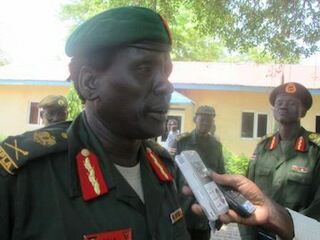S. Sudan rebels slam EU sanctions against top commander
July 12, 2014 (JUBA) – South Sudanese rebels on Saturday criticised the decision of the European Union to impose sanctions against two senior military officers from both rival factions.

They have been banned from travelling to EU member states and any assets they have in Europe will be frozen.
In a statement extended to Sudan Tribune on Saturday, the rebel faction said Gadet had been forced to rebel in December 2013 after government security forces carried out targeted killings against unarmed Nuer civilians in the capital, Juba, at the start of the conflict. This subsequently led to heavy fighting in Bentiu, Malakal and Bor, the respective capitals of Unity, Upper Nile and Jonglei states.
In January, Human Rights Watch (HRW) said it had received eyewitness accounts of the army and security forces belonging to the Dinka tribe conducting house-to-house searches for Nuer men and shooting dead those they found.
The rebel statement, which bears the name of rebel spokesperson Brigadier General Ruai Koang Lul, claimed that the defection of General Gadet had helped save the lives of millions of innocent Nuer civilians across the country.
Gadet was among a number of senior military officials, including James Koang Chuol and Gathoth Gatkuoth, who defected in response to the ethnic violence.
Lul said the defections had resulted in the creation of a military power imbalance, forcing senior military and political leaders out of Juba.
Violence in South Sudan erupted in mid-December last year after a political split emerged in the ruling SPLM, reigniting tribal tensions across the country.
The fighting has pitted government forces loyal to president Salva Kiir, a Dinka, against rebel forces aligned with former vice-president Riek Machar, who is of Nuer ethnicity
AGREEMENT VIOLATED
The statement argues that government forces were the first to initiate attacks on rebel attacks positions in the Greater Upper Nile region only hours after a ceasefire agreement signed by the rival parties in January came into effect.
Rebels also accused government troops of attacking their positions in Bentiu and retaking the strategic town in violation of an 11 May agreement aimed at resolving the crisis in South Sudan.
Gadet was slapped with the sanctions after being identified as the leader of anti-government Nuer militia that conducted an attack on Bentiu in April, in which it’s alleged more than 200 civilians were deliberately targeted and killed based on their ethnicity.
“Peter Gadet is thus responsible for fuelling the cycle of violence, thus obstructing the political process in South Sudan, and for serious human rights violations,” the EU said on 11 July.
Gadet was subject similar sanctions imposed by the US earlier this year, along with the head of the country’s presidential guards, Maj.Gen. Arial Chanuong Yol.
Lul said a number of other serious violations committed by government forces had since been confirmed by credible bodies, including a report released in May by the UN Mission in South Sudan (UNMISS).
“In the light of aforesaid continuous attacks against our forces and civilians in areas under our control, Gen. Peter Gadet had no any other viable peaceful option left at his disposal but only to fight in self-defence,” the statement said.
“It’s unfortunate that the EU miserably failed to differentiate between the aggressor and the aggressed and based on faulty reporting systems, misleading information, policy of appeasement and double standards issued unnecessary punitive measures on a renowned commander who fought for his own survival and his people,” it adds.
NO WAY FORWARD
The rebel spokesperson argued that the EU should have started by applying sanctions to the culprits of the Juba massacre, in which it alleges over 20,000 Nuer civilians were murdered by Kiir’s security forces, tribal and private militia.
“For EU sanctions to be seen as fair, meaningful, comprehensive and credible”, the rebel group has called for those “directly and personally responsible for the Juba massacre and other crimes committed by forces or personnel under their respective commands” to be held accountable.
Rebels have further called for the government’s allies, including the commanders of the Ugandan army (UPDF) and alleged foreign mercenaries from Sudan’s SLA-MM, SLA-AW and SPLA-N rebel groups, to be held accountable for their actions.
“They are also responsible for prolonging the suffering of the people of South Sudan by keeping in power Kiir and for squandering [the] nation’s financial resources paid to them in [the] form of monies as foreign mercenaries,” the statement said.
The senior rebel official argued failure to punish the culprits of the Juba killings would continue to curtail any movement forward.
He also accused the EU of placing the lives of 200 mercenaries killed in combat above those of the 20,000 Nuer civilians, mostly women and children, allegedly killed at the height of the conflict.
The South Sudanese government has also been critical of the EU’s decision to impose sanctions, describing the measures as “unfair and unjustifiable”.
Wol was sanctioned for his reported role in May’s recapture of Bentiu in violation of the ceasefire agreement in place.
(ST)
